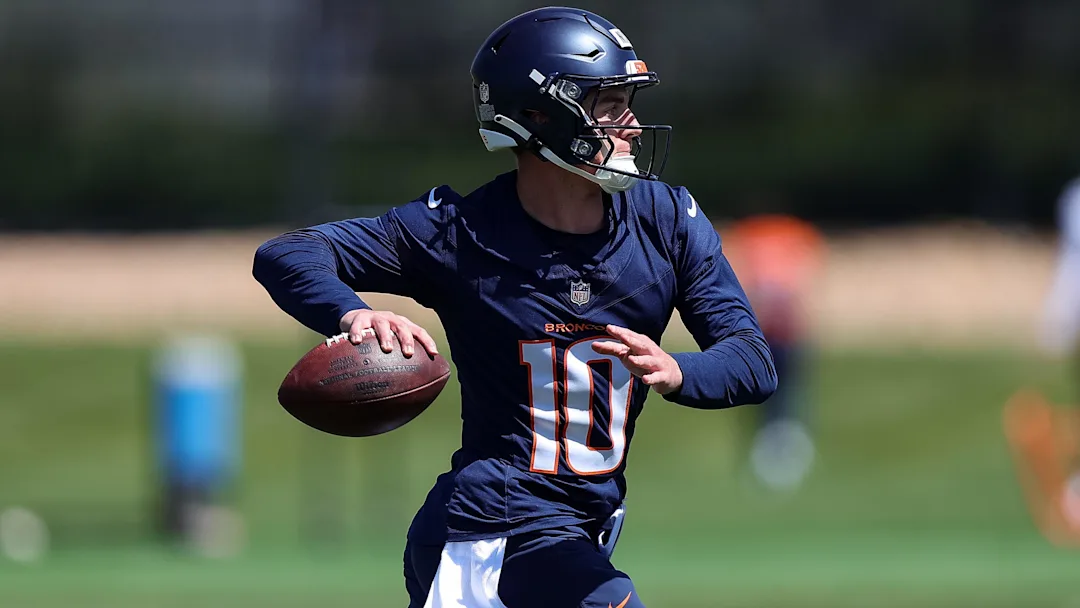Bo Nix’s arrival in Denver has sparked a lot of excitement and speculation. As the Broncos look to build on their recent progress, much of the focus naturally centers on their young quarterback. Nix’s rookie season showed flashes of promise but also the typical growing pains that come with adjusting to the NFL. Now, entering his second year, there is widespread anticipation about whether he can take the next step forward—or if he will fall victim to the dreaded sophomore slump, a phenomenon where second-year players sometimes regress or plateau after an encouraging rookie campaign.
However, when it comes to Bo Nix, there are compelling reasons to believe continuity will be his greatest asset in avoiding that slump and instead fueling meaningful improvement. Continuity in football is a powerful but often underestimated ingredient in player development, particularly for quarterbacks. The familiarity that comes with having stable systems, consistent coaching, and trusted teammates allows a player to build confidence, deepen their understanding of the game, and perform at a higher level. For Bo Nix and the Broncos, this continuity could be the difference between stagnation and breakout success in Year Two.
One of the most challenging aspects for any quarterback making the leap from college to the NFL is mastering the complexity of professional offenses. The playbooks are thicker, the defenses faster and more cunning, and the pressure to make split-second decisions is immense. Rookie QBs frequently spend a lot of time simply trying to absorb the schemes and terminology. The mental aspect is as important as physical skill, and it takes time to become truly comfortable in the role. For Nix, having the same coaching staff, offensive scheme, and many of the same teammates this year as last provides a crucial advantage. He’s no longer starting from scratch but building upon a foundation laid in his first season.
Consistency in coaching is especially vital. The Broncos’ offensive coordinator, head coach, and position coaches who worked with Nix in his rookie season have had time to learn his strengths, weaknesses, and unique tendencies. This relationship allows coaches to tailor their game plans more effectively, design plays that highlight Nix’s skill set, and make adjustments to support his growth. Likewise, Nix benefits from receiving consistent guidance and feedback, rather than having to relearn an entirely new system or adapt to different coaching philosophies. This mutual familiarity accelerates his development and helps prevent confusion or setbacks that can come from too much change.
Beyond the coaches, continuity with teammates on offense plays a huge role as well. Quarterbacks depend heavily on chemistry with their offensive line, receivers, tight ends, and running backs. Having the same group on the field fosters better communication, trust, and timing—elements that can’t be rushed. For example, receivers who have learned how Nix likes to throw the ball can adjust their routes or timing to sync perfectly with his tendencies. Offensive linemen familiar with his cadence and protection calls can better anticipate and block for him. Running backs who know his style in the pocket or when to expect handoffs can help ease pressure. These subtle but essential connections create a smoother, more efficient offense, enabling Nix to perform with greater confidence and fewer mistakes.
Another advantage of continuity is the boost it gives to a player’s mental game and confidence. Confidence is one of the most intangible yet crucial factors influencing quarterback performance. A QB who feels trusted and supported by his team is more likely to take smart risks, stay poised under pressure, and bounce back quickly from errors. The rookie season, often a whirlwind of adjustment, is a time when young players question their abilities and face self-doubt. By Year Two, Nix will have had the chance to build stronger relationships with teammates and coaches, establish a rhythm, and internalize the expectations and rhythms of NFL play. This sense of stability and belonging helps reduce anxiety and allows him to focus on refining his craft instead of just surviving.
In addition, continuity allows Bo Nix to focus more energy on physical and technical improvement rather than acclimating to change. When a player enters a new environment, a significant portion of their time and mental bandwidth is devoted to learning new playbooks, adapting to new terminology, and figuring out new personnel. That was true for Nix in his rookie season. Now, with that initial learning curve largely behind him, he can spend more time honing his mechanics, improving his decision-making, studying film, and developing leadership skills. This focused improvement is essential for avoiding the sophomore slump, which often occurs when players plateau because they haven’t fully adjusted or are overwhelmed by new variables.
Moreover, the Broncos’ organizational commitment to continuity signals faith in Nix and the long-term vision they have for him. Stability within a franchise often correlates with greater player development because the team invests in the quarterback as a central figure rather than treating him as a temporary placeholder. The more a franchise believes in and supports its quarterback, the more that player is likely to succeed. Nix’s continued presence under the same system, with the same supporting cast, is an encouraging sign that the Broncos view him as their future, which should motivate him to rise to the challenge.
Experience gained from the rookie year combined with continuity also translates to better decision-making. NFL defenses adjust quickly and expose weaknesses in young quarterbacks. In his first season, Nix encountered these challenges and now has the benefit of firsthand experience to draw upon. He has a clearer understanding of defensive tendencies, blitz packages, and coverage disguises he will face. This knowledge, coupled with the stability of his offensive scheme and coaching, enables him to anticipate more effectively, adjust protections, and avoid costly errors that lead to turnovers. As he matures mentally and physically, his improved situational awareness should allow him to make smarter, faster decisions.
It is also worth noting that many successful NFL quarterbacks have credited continuity as a key factor in their early development. Whether it is Tom Brady benefiting from consistent coaching under Bill Belichick or Patrick Mahomes having a stable offensive system with the Kansas City Chiefs, continuity allows QBs to focus on mastering their craft rather than constantly adapting to change. This environment fosters growth, confidence, and ultimately better performance on the field. Bo Nix is stepping into a similar scenario where he has the tools and environment to thrive if he capitalizes on the continuity he has been given.
While there will always be challenges and new obstacles in any player’s career, the consistency in Denver’s approach to offense and quarterback development gives Nix a tremendous advantage heading into his sophomore campaign. Rather than being burdened by a new system, unfamiliar coaches, or a changing supporting cast, he can rely on the relationships and knowledge established during his rookie year. This stability is a springboard for improvement, not a hindrance.
In short, the continuity Bo Nix enjoys with the Broncos is not just a comforting notion—it is a tangible factor that increases the likelihood he will avoid the sophomore slump and make the leap from promising rookie to dependable starter. The continuity in coaching, scheme, teammates, and organizational support creates the ideal environment for Nix to refine his skills, build confidence, and perform at a higher level. As the Broncos move forward, that stability could be the key that unlocks Nix’s full potential and helps the franchise regain its competitive edge.
The sophomore slump is a common narrative in sports, but it is not inevitable. With the right circumstances—like the continuity surrounding Bo Nix—it becomes far less likely. For Broncos fans and observers, that continuity is a promising sign that the young quarterback is poised to build on his rookie year, avoid common pitfalls, and become a player who leads the team with poise, skill, and growing confidence. The foundation has been laid; now it’s time for Bo Nix to rise.



